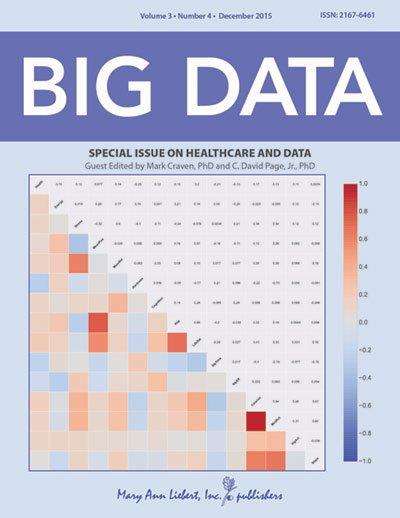Big data is transforming healthcare—from diabetes to the ER to research

The ability to monitor, record, analyze, and integrate information about human biology and health, at scales ranging from molecular interactions to disease prevalence in large populations, is transforming biomedical science and human health. Exploring the opportunities and challenges for applying big data analysis to solve some of the biggest issues facing healthcare today is the focus of a special issue of Big Data.
Guest Editors Mark Craven, PhD and C. David Page, Jr., PhD, University of Wisconsin-Madison, present a series of Perspective, Review, and Original Research articles that provide an in-depth look at applications of big data analytics in biomedicine. They introduce the field and the individual articles in the special issue in their Editorial entitled "Big Data in Healthcare: Opportunities and Challenges."
Featured articles include "Population-Level Prediction of Type 2 Diabetes From Claims Data and Analysis of Risk Factors," by Narges Razavian and colleagues from New York University and NYU Langone Medical Center (New York, NY) and Independence Blue Cross (Philadelphia, PA). The researchers describe a new data-driven approach to population health in which they use machine learning to develop predictive models and risk factors for the onset of type 2 diabetes. They base the model on claims data, pharmacy records, healthcare utilization information, and laboratory results gathered on 4.1 million individuals over 4 years. The model identifies new risk factors for type 2 diabetes and is at least 50% better at predicting disease onset than a model based on known risk factors used for comparison.
In the article "Mining the Quantified Self: Personalized Knowledge Discovery as a Challenge for Data Science," Tom Fawcett, Silicon Valley Data Science (Mountain View, CA), examines the opportunities to analyze and apply the large amounts of data that individuals are collecting from the lifestyle trend of wearing personal tracking devices. He discusses the "quantified self problem" and proposes a way to connect users' data to "actionable insights" and decisions of interest.
"The articles in this issue cover a range of applications of data in healthcare," says Big Data Editor-in-Chief Vasant Dhar, Professor at the Stern School of Business, New York University. "They demonstrate a variety of uses of data, from more accurate and timely diagnoses of diabetes to the use of personal data collected through wearable devices for individualizing the advice targeted to users based on their own data."
More information: Mark Craven et al. Big Data in Healthcare: Opportunities and Challenges, Big Data (2015). DOI: 10.1089/big.2015.29001.mcr



















